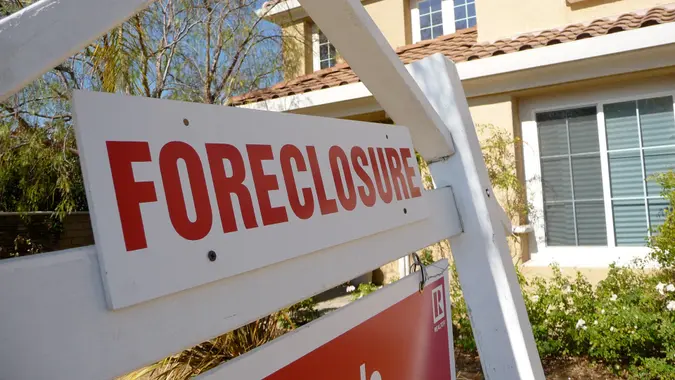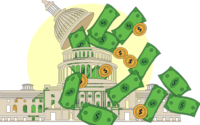5 Key Signs of a Housing Bubble

Jeff Turner / Flickr.com
A housing bubble can cause property prices to soar to unrealistic levels, leading to an eventual crash that can have detrimental effects on homeowners and the economy as a whole.
In 2008, this exact scenario played out, causing millions of Americans to lose their homes to mortgage foreclosures and sending aftershocks through the economy that were felt for years.
Here are five key signs of an impending housing crash and ways to protect yourself financially to survive the impact.
1. Rapid and Unsustainable Price Increases Starts To Plateau
Seth Jacobs, an experienced Mortgage Broker and Founder of Maine USDA Home Loan, said, “When housing prices rise at an unusually fast pace over a short period, it could indicate a housing bubble.”
While homes are appreciating assets, their prices won’t go up forever. So, if you start to see home prices plateau after skyrocketing, watch out.
And if this price growth has significantly outpaced income growth and other economic indicators, you should be even more careful, he warns.
Check out the Case-Shiller home price index available on the St. Louis Federal Reserve website to see how housing prices have changed on a national level over time.
If you notice rapid and unsustainable price increases in the housing market followed by a plateau or decline, Jacobs suggests that you delay any major real estate purchases and focus on building a strong emergency fund or diversifying your investments to reduce exposure to a potential housing downturn.
2. Excessive Mortgage Debt and Risky Lending Practices
“An increase in high-risk lending, such as subprime mortgages or loans with minimal down payments, is another key sign of a housing bubble,” said Jacobs.
When lenders extend credit to borrowers with weak credit histories or offer loans with terms that may become unaffordable in the long term, the housing market could be in deep trouble when borrowers default en masse.
When the bubble eventually bursts, as it inevitably will, the effects of excessive mortgage debt and risky lending practices can be catastrophic. Home values plummet, borrowers default on their loans and the economy as a whole suffers.
For example, though the housing market crash in 2008 had a complex web of factors at play, one major cause of the collapse was due to irresponsible lending practices by banks that provided risky subprime loans.
These subprime loans were packaged into complex financial instruments, also known as mortgage-backed securities, which gave investors the impression that they were buying safe and secure assets.
However, in reality, these mortgage-backed securities were built on a foundation of unstable loans. And when borrowers of these subprime loans began to default, the entire economic system crumbled.
If you’re in the market for a mortgage, make sure you have a clear understanding of the terms and potential payment adjustments before signing on the dotted line.
Remember to also use a mortgage calculator to determine how much home you can afford based on your current lifestyle and financial situation.
3. Rising Mortgage Rates
When mortgage rates are low, demand for properties is usually high since most aspiring homeowners want to lock in a good interest rate.
On the other hand, rising mortgage rates may indicate that the housing market is about to take a turn for the worse.
Here’s why: Rising interest rates can dampen enthusiasm for homeownership and decrease the number of potential buyers. When demand dwindles, sellers will be at a disadvantage with fewer buyers, which may result in a dip in home prices.
So, if you’re planning to buy or invest in a property, keep an eye on interest rate movements since they can significantly impact the real estate market.
4. Elevated Speculative Activity and Overbuilding
“If there’s a surge in speculative buying or excessive construction of new properties without a corresponding increase in demand, it could signal an oversupply in the market. This oversupply can drive prices down as supply outpaces demand, leading to a potential housing crash,” said Jacobs.
A recent study by the Centre for Economic Policy Research (CEPR) found that housing speculation not only led to “greater price appreciation, economic expansions, and housing construction during the boom from 2004 to 2006 but also more severe economic downturns during the subsequent bust from 2007 to 2009.”
If you’re an aspiring homeowner, Jacobs advises against investing too heavily in property with the sole purpose of short-term gains. Instead, he suggests focusing on long-term value and “avoid overleveraging with multiple properties.”
If you’re considering selling, “be aware of market trends and don’t wait too long if signs of oversupply become evident,” he added.
5. Overall Downturn in the Economy
An overall downturn in the economy leads to less disposable income, fewer job openings, and more job losses, which negatively affects consumer confidence and decreases the demand for housing.
Simply put, the financial strain that the average consumer faces during an economic downturn could lead to a slowdown in the housing market.
A downturn in the economy, or a recession, is defined as at least two consecutive quarters of negative GDP growth and is generally accompanied by an increase in unemployment rates and a decrease in consumption by the general public.
Typically, when the economy is up, consumer confidence is high, and so is housing demand. However, if the economy is not doing so well, consumer confidence dwindles and housing demand falls.
Before searching for your next home on Zillow, take a look at Fannie Mae’s monthly National Housing Survey to gauge the public’s sentiments around home purchasing and determine whether there could be an impending housing crash.
For example, as of August 2023, only 18% of those surveyed believe it’s a good time to buy a home, compared to 61% in June 2020.
Protect Yourself If the Bubble Bursts
Housing bubbles don’t form and burst out of thin air. There are always early warning signs to be on the lookout for. By recognizing these red flags early on, you can safeguard your finances in the face of a housing bubble.
“The key to protecting your finances during a potential housing crash is by staying informed about local and national housing market trends and ensuring your overall financial picture is diversified and resilient,” said Jacobs.
So, if you suspect a housing bubble is forming, prioritize your savings, reduce debt, and avoid making major financial commitments until the market stabilizes.
More From GOBankingRates
[ad_2]
Source link


